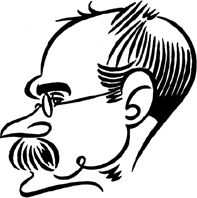
IF, written by Nobel laureate and poet Rudyard Kipling is a must-read for every trader. It provides a list of qualities that a successful trader must possess, even though the poem itself was written for the general audience.
If you can keep your head when all about you
Are losing theirs and blaming it on you,
If you can trust yourself when all men doubt you
But make allowance for their doubting too,
If you can wait and not be tired by waiting,
Or being lied about, don't deal in lies,
Or being hated, don't give way to hating,
And yet don't look too good, nor talk too wise:
If you can dream–and not make dreams your master,
If you can think–and not make thoughts your aim;
If you can meet with Triumph and Disaster
And treat those two impostors just the same;
If you can bear to hear the truth you've spoken
Twisted by knaves to make a trap for fools,
Or watch the things you gave your life to, broken,
And stoop and build 'em up with worn-out tools:
If you can make one heap of all your winnings
And risk it all on one turn of pitch-and-toss,
And lose, and start again at your beginnings
And never breath a word about your loss;
If you can force your heart and nerve and sinew
To serve your turn long after they are gone,
And so hold on when there is nothing in you
Except the Will which says to them: "Hold on!"
If you can talk with crowds and keep your virtue,
Or walk with kings–nor lose the common touch,
If neither foes nor loving friends can hurt you;
If all men count with you, but none too much,
If you can fill the unforgiving minute
With sixty seconds' worth of distance run,
Yours is the Earth and everything that's in it,
And–which is more–you'll be a Man, my son!
***
on December 30, 1865, in the J. J. School of Arts, of which, his father, Lockwood Kipling, was then head.
At the age of six, he was left in a foster home in England. He was extremely unhappy at his foster home, but stayed there until 1878, when he entered a boarding school in England. His later writings indicate that he was happy at school, where he started writing.
He returned to India in 1882 and joined his parents in Lahore where he worked as a journalist with Civil and Military Gazette. In 1887 he joined The Pioneer in Allahabad as an assistant editor and overseas correspondent.
![[Most Recent Quotes from www.kitco.com]](http://www.kitconet.com/charts/metals/gold/t24_au_en_ingr_2.gif)
![[Most Recent Exchange Rate from www.kitco.com]](http://www.weblinks247.com/exrate/24hr-inr-small.gif)






1 Comment:
very nice one..
thanks for posting.
Post a Comment